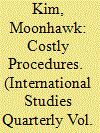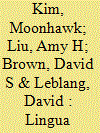| Srl | Item |
| 1 |
ID:
083541


|
|
|
|
|
| Publication |
2008.
|
| Summary/Abstract |
Increasing legalization of international institutions has divergent effects on member countries. Whereas legalization decreases uncertainty and increases convergence of countries' expectations on international outcomes, it imposes costs on countries by increasing the complexity and difficulty of procedures for them to utilize. Countries with the administrative capacity to follow elaborate procedures reap the benefits of increased legalization. For countries without such capacity-primarily developing countries-the potential benefits are offset by their difficulty in following the procedures. I examine this argument against the institutional changes in dispute settlement procedures that occurred in the transition from the General Agreement on Tariffs and Trade (GATT) to the World Trade Organization (WTO). Compared to the GATT era, developed countries-ones with greater capacity-are much more likely to utilize dispute settlement in the WTO than developing countries. Gains from the institutional changes in dispute settlement procedures have accrued to benefit mostly developed member countries in the WTO.
|
|
|
|
|
|
|
|
|
|
|
|
|
|
|
|
| 2 |
ID:
114496


|
|
|
|
|
| Publication |
2012.
|
| Summary/Abstract |
Member states of the gatt/wto have linked some issue-areas outside trade to the institution and did so with varying depths. At the same time they have chosen not to link other issue-areas. What accounts for this variation? The author argues that states establish a legalized linkage between the gatt/wto and an issue-area outside it when they are uncertain about the possibilities of disguised protectionism. Such uncertainty exists under two conditions: when diversity in regulations in an issue-area across states generates a large adverse impact on trade (negative externalities) but that diversity can be justified at the international level for (1) having an independent objective apart from hampering trade and (2) when there are few alternative policies to achieve that objective (legitimacy). States establish a highly legalized linkage in these situations to reduce the uncertainty and minimize disguised protectionism. By contrast, when regulatory diversity exhibits low legitimacy, states establish only a weakly legalized linkage. In the absence of meaningful externalities, they do not establish any linkages. The author evaluates this argument in two ways. He provides an overview of eleven issue-areas about which there have been some debates or conflicts about linkages to the gatt/wto. In addition, he carries out in-depth case studies of three issue-areas-labor standards, environmental standards, and health safety standards. The findings of this article contribute to a better understanding of international institutions and cooperation as well as of the evolution of the multilateral trade institution.
|
|
|
|
|
|
|
|
|
|
|
|
|
|
|
|
| 3 |
ID:
118172


|
|
|
|
|
| Publication |
2012.
|
| Summary/Abstract |
Do fair trade PTAs-trade agreements that contain provisions for protection of labor rights-lead to improvements in labor protection in PTA partner states? If so, how do the PTAs bring about such improvements? I argue that trade partner states are likely to engage in ex ante due diligence and improve the protection of labor rights at home before they sign or even enter into negotiations for a PTA. Given that large developed economies have increasingly placed value on strong labor protection, trade partners of these economies act on the belief that, holding other factors constant, having stronger labor protection will increase their attractiveness as a potential or a prospective PTA partner. I test this argument in the context of the United States and its trade partners between 1982 and 2005. The evidence shows that trade partner states indeed are much more likely to improve labor protection (i) prior to the 2002 Trade Act publicizing the importance of labor protection and (ii) prior to signing a PTA with the United States.
|
|
|
|
|
|
|
|
|
|
|
|
|
|
|
|
| 4 |
ID:
139533


|
|
|
|
|
| Summary/Abstract |
Does language choice attract foreign direct investment (FDI), and if so, how? We argue that language—a dynamic instrument for reducing transaction costs—can influence investors' decision to allocate capital. Potential host countries attract investments by coordinating their domestic language policies—especially those in education—to match the language of the potential FDI investor. We subject our argument to three different tests: (i) a cross-sectional sample of all global Organization for Economic Co-operation and Development investments that employs a newly constructed language-in-education measurement; (ii) a newly assembled time-series cross-sectional data set of all Chinese FDI abroad; and (iii) a detailed case study that uses process tracing to explain Chinese FDI in Indonesia. The results from these tests demonstrate a significant and robust relationship between language and FDI.
|
|
|
|
|
|
|
|
|
|
|
|
|
|
|
|